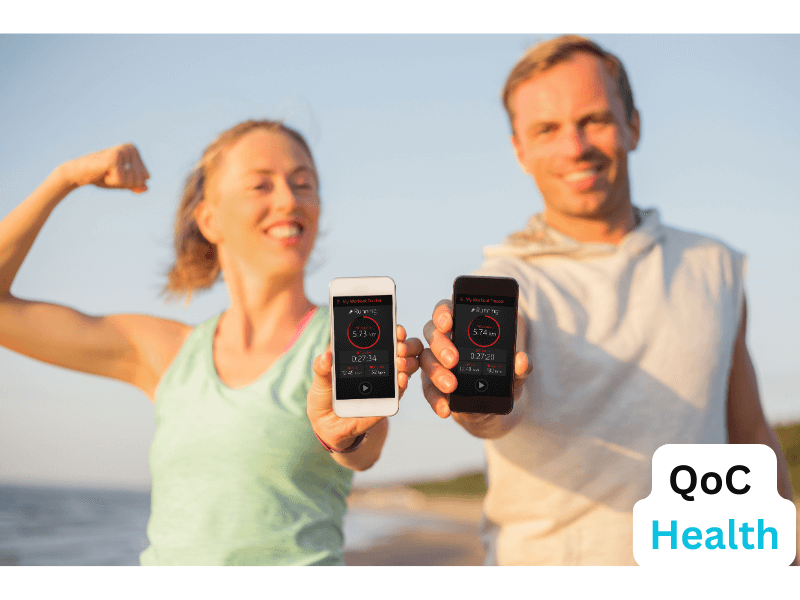Have you ever wondered if a mobile app can help you lose weight? The answer is yes! Mobile apps offer handy tools and tips to make losing weight easier. They can track your food, count calories, and even remind you to exercise.
Let’s explore how these apps work and why they might be just what you need.
Understanding Weight Loss Apps
Weight loss apps are your digital buddies in the journey to lose weight. They live on your phone, give you tips, track your progress, and motivate you. They’re like a coach in your pocket!
Types of Weight Loss Apps
There are several kinds of weight loss apps:
- Tracking Apps: These apps count your steps, track your food, and record how much water you drink.
- Community-Based Apps: Here, you can share tips and stories with other people trying to lose weight.
- Educational Apps: These apps teach you about healthy eating and exercise.
- Each type helps you in different ways on your weight loss journey.
- Popularity and User Base
Lots of people use weight loss apps. Millions have downloaded them. These apps are popular because they’re easy to use and can be accessed anytime, anywhere.
Key Features of Effective Apps
The best weight loss apps have:
- Easy Tracking: You can quickly log your meals and workouts.
- Goal Setting: They help you set and reach your weight loss goals.
- Reminders: They remind you to drink water, eat healthily, and move more.
- These features work together to help you stay on track.
Weight loss apps can help you lose weight. They’re easy to use and can be a great addition to your weight loss plan. So, why give one a try?
The Science Behind Weight Loss Apps
Studies and Research
Science says weight loss apps can work! Research shows these apps help people lose weight. How? They make tracking food and exercise simple.
Also, seeing your progress on the app motivates you to keep going. Studies have found that people who use these apps lose more weight than those who don’t.
Psychological Aspects
Weight loss apps do more than count calories. They boost your willpower and motivation. Setting goals and celebrating your achievements make losing weight feel more like a fun game and less like a chore. This can lead to better habits and more weight loss.
Limitations and Criticisms
But remember, apps are tools, not magic. They work best when you use them right. Sometimes, the calorie counts might be off. And they can’t replace advice from doctors or dietitians. It’s important to use them along with other healthy habits.
Related: Weight Loss Benefits And Do They Work?
Top Weight Loss Apps and Their Unique Offerings

App Profiles
Let’s look at some popular weight loss apps:
- MyFitnessPal: Great for tracking meals and exercise.
- Fitbit: Awesome for counting steps and activity.
- Noom: Offers a unique approach combining psychology and nutrition.
Each app has special features to help you on your weight loss journey.
Comparative Analysis
When it comes to weight loss apps, finding the one that aligns with your goals and preferences is essential. Let’s investigate a comparative analysis of three popular apps: MyFitnessPal, Fitbit, and Noom.
Related: The Impact Of Smartphone on Patients
MyFitnessPal: Detailed Food Tracking
MyFitnessPal stands out for its exceptional food-tracking capabilities. With a vast food database and barcode scanner, logging your meals is a breeze. It provides in-depth nutritional information, helping you make informed choices.
The app also allows you to set calorie goals and track your progress. If you want to focus on your diet and understand the importance of food choices in weight loss, MyFitnessPal might be your ideal companion.
Fitbit: Activity Tracking and Device Integration
Fitbit shines in the realm of activity tracking and seamless device integration. Whether counting your steps, monitoring your heart rate, or even tracking your sleep patterns, Fitbit covers everything.
It syncs effortlessly with Fitbit devices, making it a top choice for those who prioritize physical activity and want a comprehensive overview of their daily movements. If you’re motivated by data and enjoy having a wearable fitness tracker, Fitbit could be the perfect fit.
Related: How Do Mobile Impact Health Care?
Noom: Calorie Counting with Behavior Change
Noom takes a unique approach by combining calorie counting with behavior change lessons. It offers psychological insights and encourages mindful eating.
Noom’s coaching feature provides personalized guidance, making it suitable for individuals looking for a holistic approach to weight loss. If you want to address what you eat and why you eat, Noom’s behavioral approach might resonate with you.
The best weight loss app [1] for you depends on your priorities and preferences. Consider what aspect of your health journey matters most—diet, activity, or behavior change—and choose the app that aligns with your goals. Each of these apps has strengths, so select the one that fits your style and aspirations the best.
Integrating Apps into a Weight Loss Plan
Setting Realistic Goals
To succeed with weight loss apps [2], start by setting achievable goals. These could be losing a few pounds a month or eating more veggies. Apps help you track progress and adjust your goals as you go.
Combining Apps with Diet and Exercise
Apps are like your weight loss buddies, but they work best when they have real-world partners. Combine apps with a balanced diet and regular exercise. Eat more fruits, veggies, and lean proteins. Exercise regularly, even if it’s just a daily walk. Apps can track your progress in these areas, too!
Monitoring Progress and Adjusting Goals
Apps keep you on track but also let you adapt your plan. If you’re not losing weight, the app can suggest changes. You may need to cut back on sweets or increase your workout time. Regularly checking your progress helps you stay motivated.
Weight loss apps are powerful tools when used alongside a healthy diet and exercise routine. They help you set and achieve goals, making your weight loss journey smoother and more effective.
The Future of Weight Loss Apps
As technology advances, the future of weight loss apps holds exciting possibilities. Here, we explore emerging trends that could shape how we use these apps to achieve our fitness goals.
Emerging Trends in Weight Loss Apps
The world of weight loss apps is on the brink of transformation. Expect to see:
- AI-Powered Guidance: Tomorrow’s apps might employ Artificial Intelligence to analyze your data and offer tailored advice. Imagine having a virtual nutritionist in your pocket, ready to help you make healthier choices.
- Virtual Coaches: Personalized motivation could come in the form of virtual coaches. These digital companions will encourage and guide you through your weight loss journey, making it feel like you have a supportive friend by your side.
- Wearable Integration: Wearable technology is set to play a more significant role. Apps will seamlessly sync with your fitness tracker or smartwatch, providing real-time data and insights. This integration will make tracking your progress even more convenient and accurate.
The future of weight loss apps is promising, with technology poised to make our fitness journeys smarter, more personalized, and ultimately more successful. Stay tuned for these exciting developments!
Concluding Thoughts
So, can mobile apps help you lose weight? Absolutely! They provide valuable support, tracking, and motivation on your journey. But remember, they’re just one piece of the puzzle. Combine them with healthy habits, and you’ll be well on your way to a healthier, happier you.
Weight loss apps are not a magic solution, but they’re powerful tools when used with dedication and a commitment to a healthier lifestyle.
References
- “Sustainability of Weight Loss Through Smartphone Apps: Systematic Review and Meta-analysis” NIH. Link
- “Weight Loss Apps Will Likely Help You Shed Pounds” – Everyday Health. Link
- How To increasebrown fat: What To Take? - July 23, 2024
- Does Brown Fat Make You Lose Weight? Benefits And Impact - July 21, 2024
- Does Coffee Increase Brown Fat? - July 15, 2024
